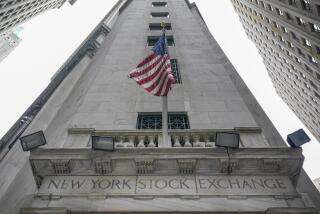2 big sub-prime losers shore up their reserves
- Share via
A stream of cash from private investors into banks and other companies that have been hurt by the sub-prime mortgage crisis is raising hope that battered financial stocks have hit bottom.
Swiss banking giant UBS and No. 1 bond insurer MBIA Inc. on Monday became the latest financial companies to attract money from outside investors to fortify their capital in the face of expected mortgage-related losses.
Similar cash-raising moves were announced in recent weeks by Citigroup Inc., Freddie Mac and E-Trade Financial Corp.
And Los Angeles-based Capital Research & Management Co., one of the country’s biggest mutual fund managers, said Monday it boosted its stake in Fannie Mae in October and November as the mortgage finance giant’s stock fell as much as 55%.
Of course, the capital injections underscore the deep losses that financial firms have suffered, and the money is in many cases coming at a steep price. And some market experts doubt the sector’s recovery is imminent.
Nonetheless, financial shares rallied sharply Monday, pushing the overall stock market up, as investors took comfort in the apparent ability of UBS and others to raise capital. After falling sharply in October and November, an index of financial stocks is up 13% from its recent low on Nov. 26, though it remains down 14% for the year.
“Smart money is beginning to say, ‘Wait a second, these great companies were knocked 15%, 20%, 30% off their peaks. I’d like to own some of that,’ ” said James Glickenhaus, a partner at investment firm Glickenhaus & Co. in New York. “It’s selective nibbling, but it takes on a life of its own. It’s like, ‘Johnny’s buying some. Maybe I should, too.’ ”
UBS announced its $11.5-billion infusion from the government of Singapore and an unidentified Middle Eastern investor at the same time that it disclosed a further $10-billion in write-downs on mortgage-related holdings. But the bank’s U.S.-traded shares climbed $1.18, or 2.3%, to $51.66 on the news.
MBIA’s shares, meanwhile, rose $3.95, or 13%, to $33.95 after the insurer said private equity firm Warburg Pincus was buying as much as $1 billion in MBIA’s common stock.
The infusions say that “maybe these people see value, that maybe conditions aren’t as bad” in the financial sector as many had feared, said David Ellison, chief investment officer of the FBR mutual-fund group.
Capital Research, a self-described value investor and manager of the American Funds group, said in a filing with the Securities and Exchange Commission that its funds owned 228 million shares of Fannie Mae on Nov. 30, or 23.3% of the outstanding stock, up from 21.4% on Sept. 30. Fannie Mae slipped 13 cents to $36.91 on Monday but is up 31% from its recent low.
The private investors as well as anyone buying financial shares on the open market are betting that their prices already reflect deep sub-prime losses expected in the fourth quarter and are unlikely to sink much lower.
The infusions could spur further buying, some analysts said, by boosting investor confidence.
The sub-prime crisis and resulting credit crunch have dragged on in part because investors have hesitated to buy troubled securities and other mortgage assets until they have bottomed out. The willingness of sophisticated investors to pump money into the companies that own those assets could mark a turning point, some say.
But others point out that investors moved back to financial stocks in September after a summer sell-off on the assumption that the banks had endured their worst mortgage hits. The sector fell into a tailspin in October when the eventual losses far exceeded expectations.
In a sign of continuing distress, shares of Washington Mutual Inc. fell sharply in after-hours trading Monday after the savings and loan announced at least $1.5 billion in provisions for loan losses, notwithstanding the company’s plan to sell $2.5 billion in convertible preferred stock to the public.
Doubters also could point to Bank of America’s $2-billion investment in beleaguered mortgage lender Countrywide Financial Corp. in late August.
BofA received preferred stock that is convertible into Countrywide common stock at $18 a share. But as Countrywide’s woes intensified, its shares fell as low as $8.21. They rose 97 cents Monday to $12.51.
And though the banks and others can draw new money, it often doesn’t come cheap. Citigroup is paying an 11% interest rate on the $7.5 billion it received from the investment arm of the Abu Dhabi government. Citadel Investment Group paid only 27 cents on the dollar for the $3 billion in troubled mortgage securities it bought from E-Trade late last month.
And as long as Countrywide remains afloat, BofA collects a dividend equal to 7.5% of its investment.
“Given the very gloomy situation, certainly these investments are as good as we can hope for,” said Bruce Fenton, president of Atlantic Financial Inc., a Norwell, Mass., investment firm.
Still, the shares could continue rallying, bulls say, simply because investors are looking for stocks that have the potential to notch big gains.
Whenever “there’s any whiff of good news, there’s tons of money out there looking for returns,” FBR’s Ellison said.
--
More to Read
Inside the business of entertainment
The Wide Shot brings you news, analysis and insights on everything from streaming wars to production — and what it all means for the future.
You may occasionally receive promotional content from the Los Angeles Times.










